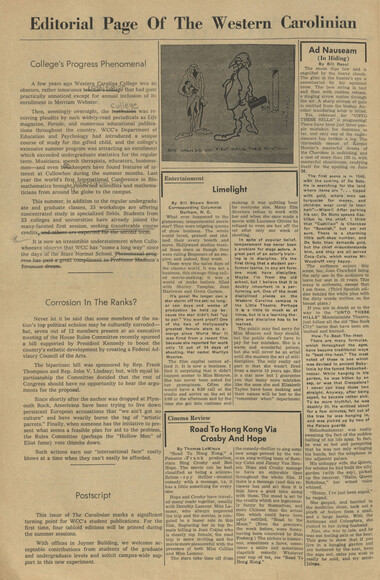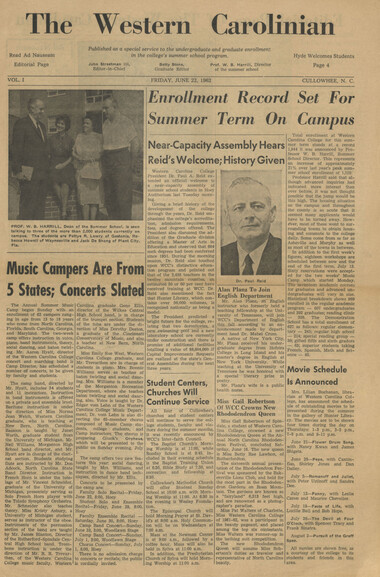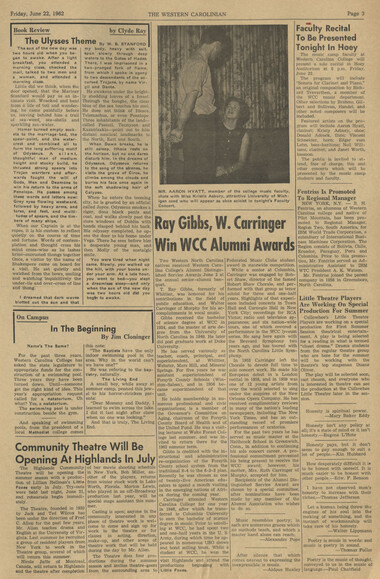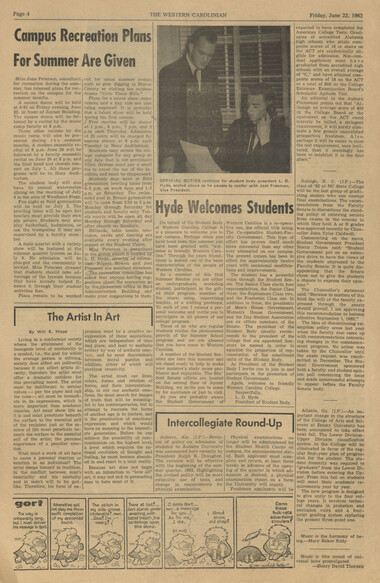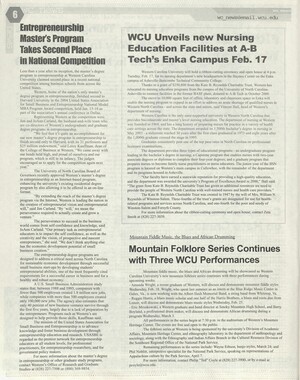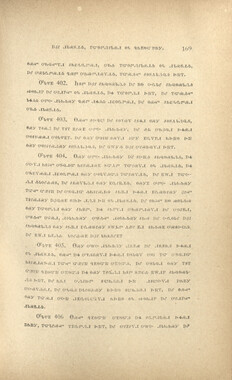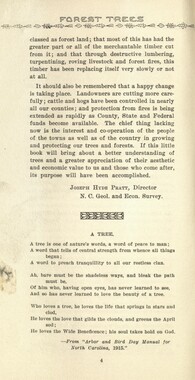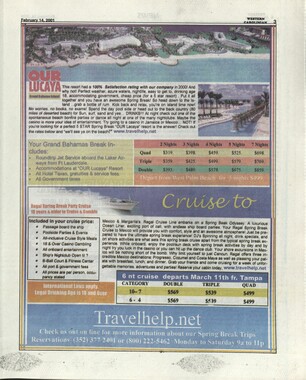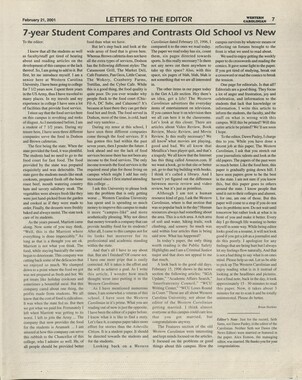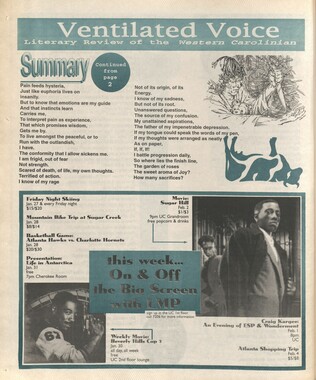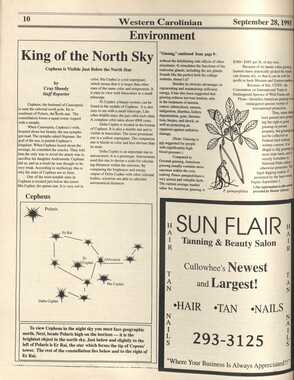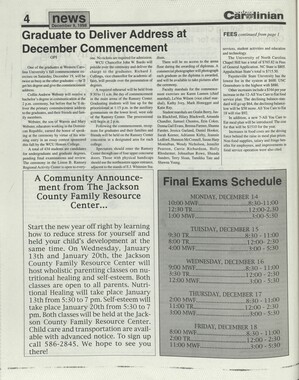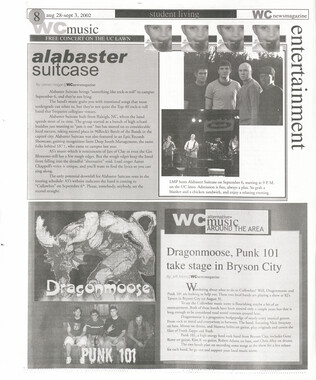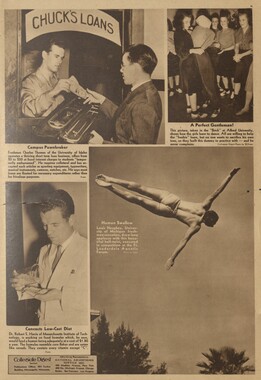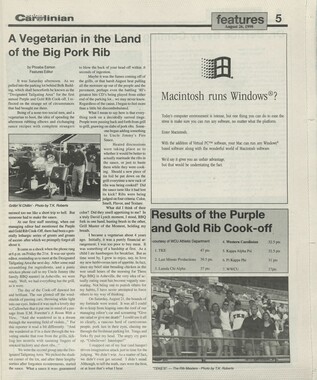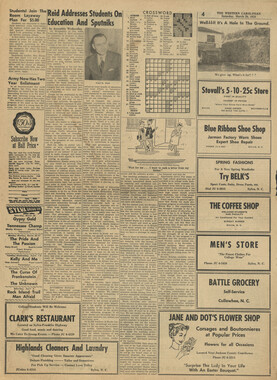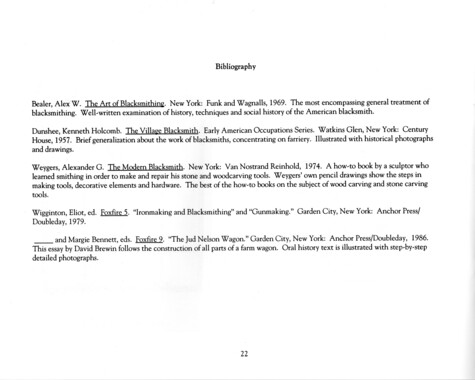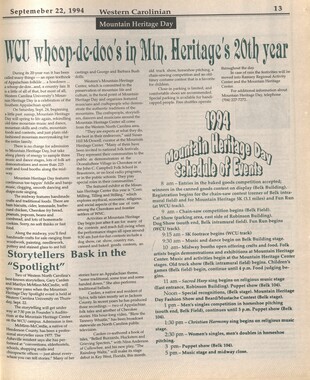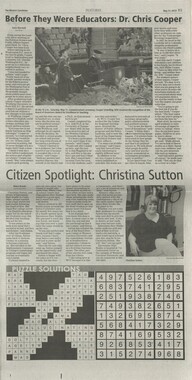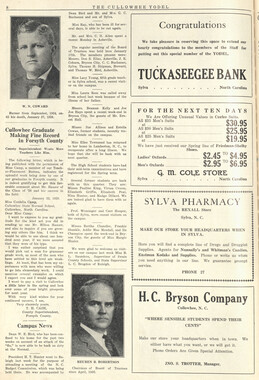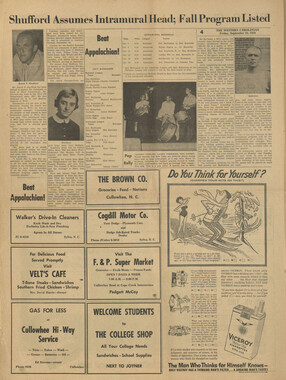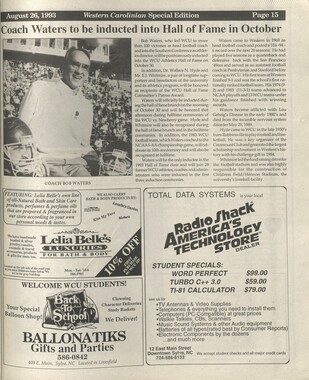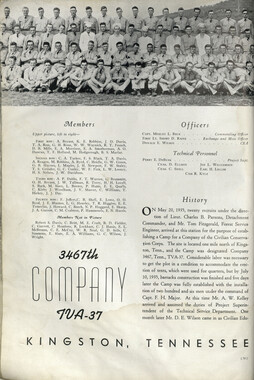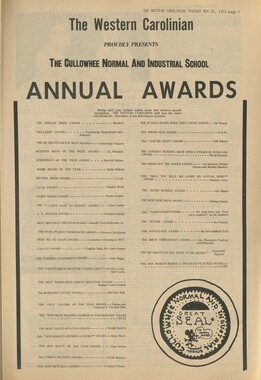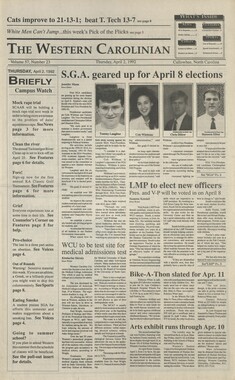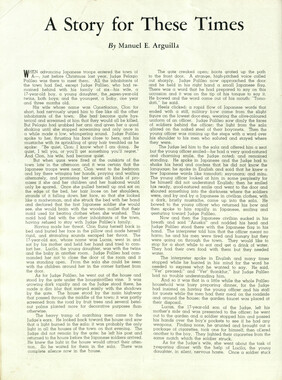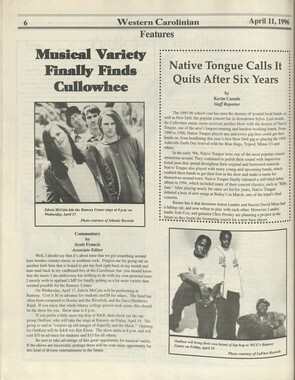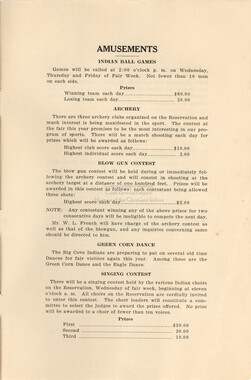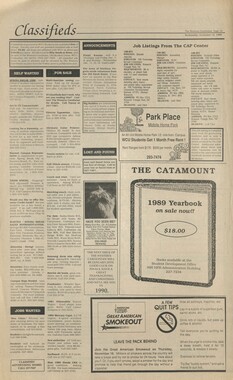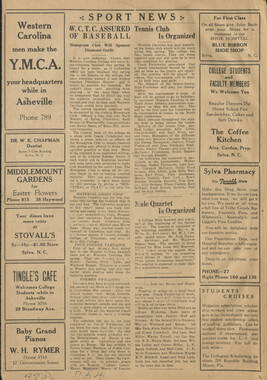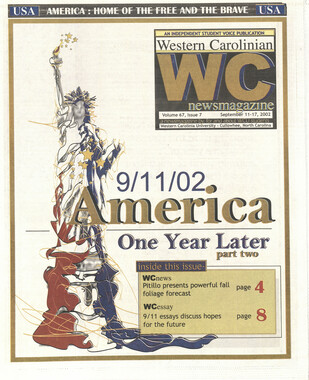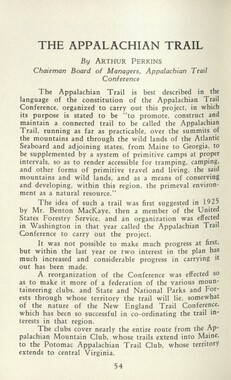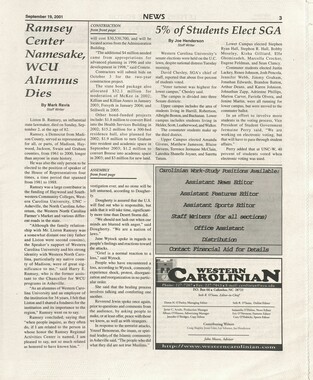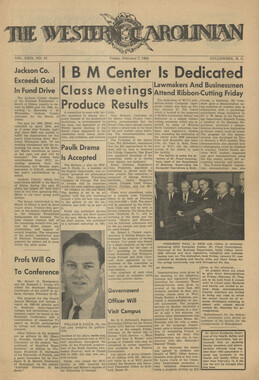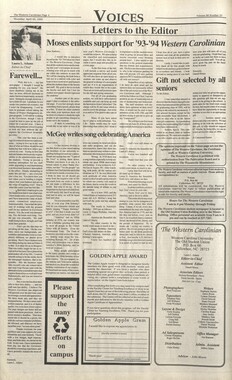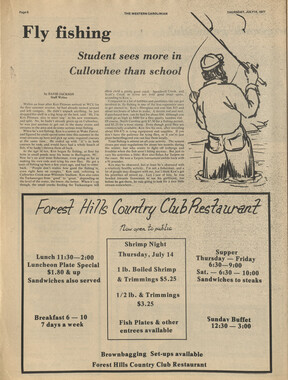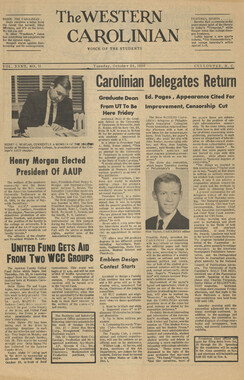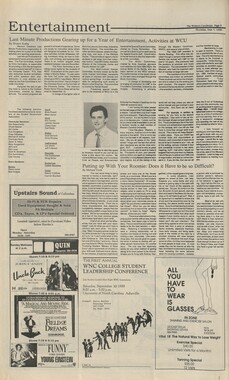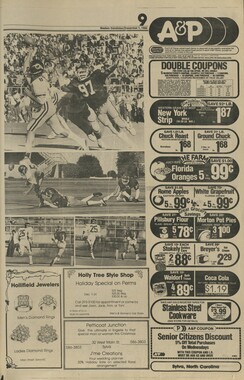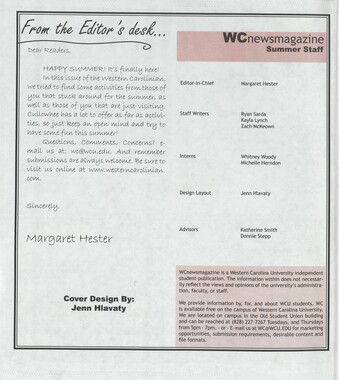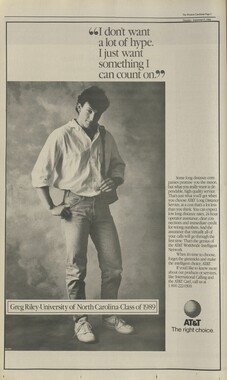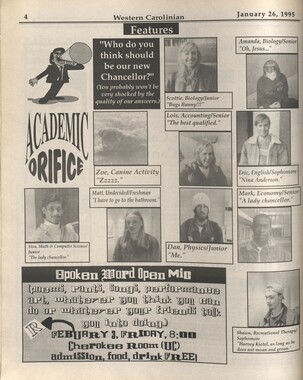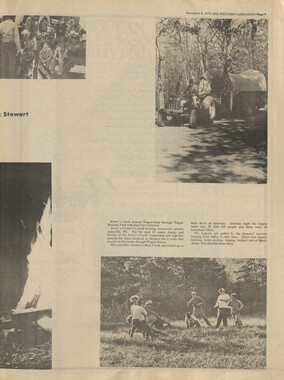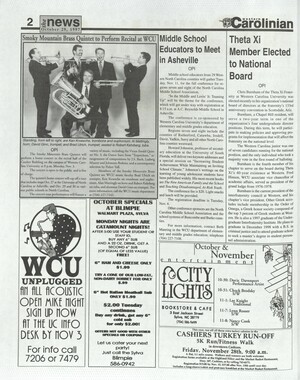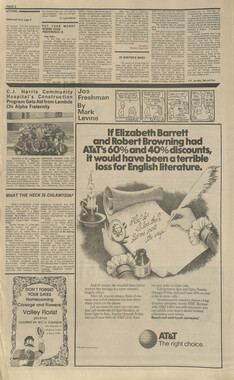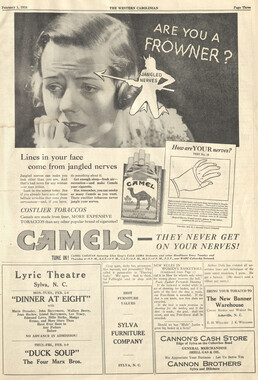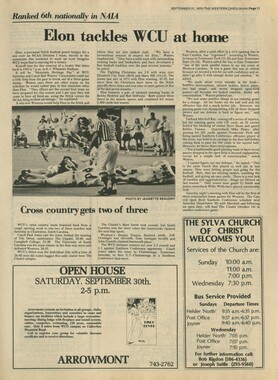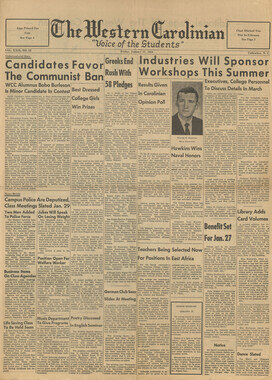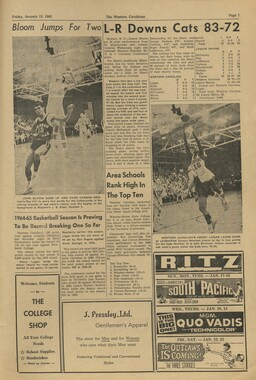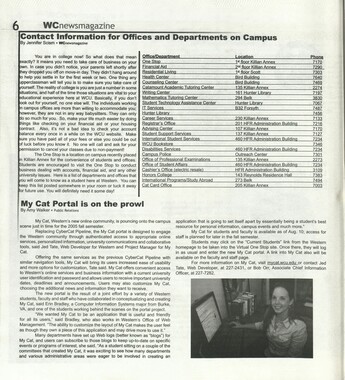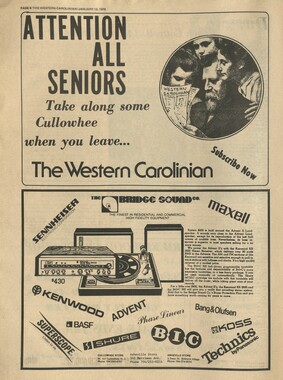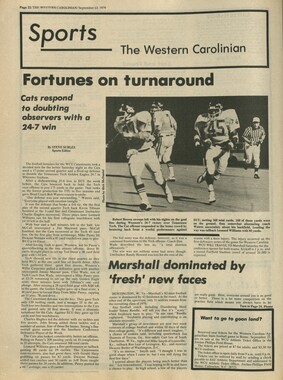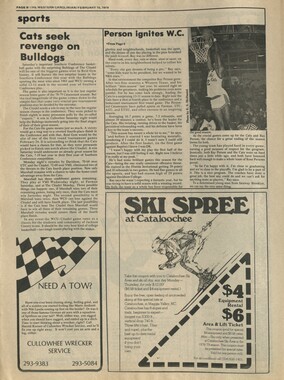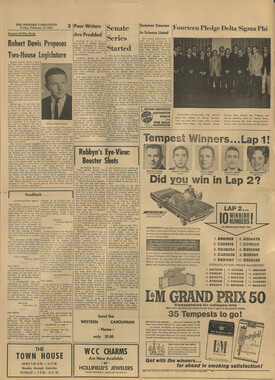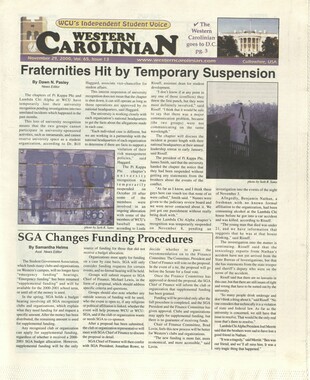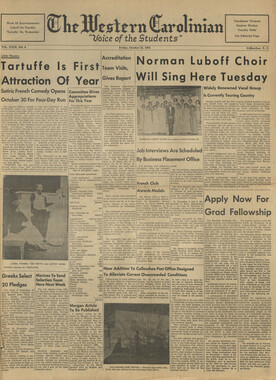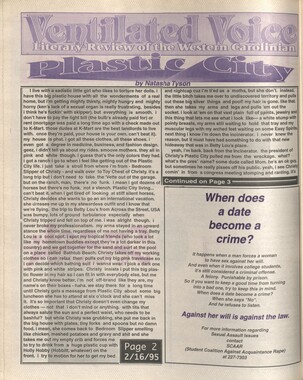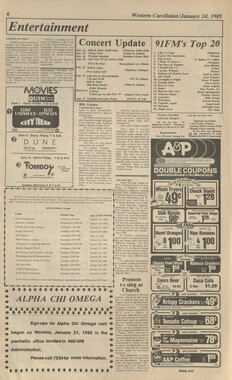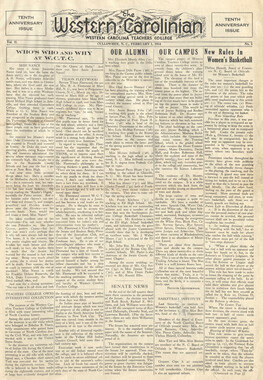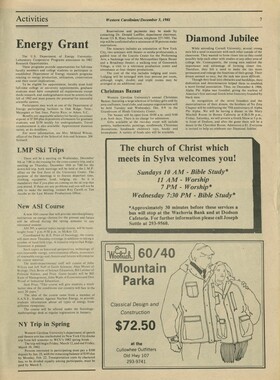Western Carolina University (21)
View all
- Canton Champion Fibre Company (2308)
- Cherokee Traditions (291)
- Civil War in Southern Appalachia (165)
- Craft Revival (1942)
- George Masa Collection (137)
- Great Smoky Mountains - A Park for America (3080)
- Highlights from Western Carolina University (422)
- Horace Kephart (998)
- Journeys Through Jackson (159)
- LGBTQIA+ Archive of Jackson County (90)
- Oral Histories of Western North Carolina (318)
- Picturing Appalachia (6617)
- Stories of Mountain Folk (413)
- Travel Western North Carolina (153)
- Western Carolina University Fine Art Museum Vitreograph Collection (129)
- Western Carolina University Herbarium (92)
- Western Carolina University: Making Memories (738)
- Western Carolina University Publications (2491)
- Western Carolina University Restricted Electronic Theses and Dissertations (146)
- Western North Carolina Regional Maps (71)
- World War II in Southern Appalachia (131)
University of North Carolina Asheville (6)
View all
- Allanstand Cottage Industries (62)
- Appalachian National Park Association (53)
- Bennett, Kelly, 1890-1974 (1463)
- Berry, Walter (76)
- Brasstown Carvers (40)
- Carver, George Washington, 1864?-1943 (26)
- Cathey, Joseph, 1803-1874 (1)
- Champion Fibre Company (233)
- Champion Paper and Fibre Company (297)
- Cherokee Indian Fair Association (16)
- Cherokee Language Program (22)
- Crowe, Amanda (40)
- Edmonston, Thomas Benton, 1842-1907 (7)
- Ensley, A. L. (Abraham Lincoln), 1865-1948 (275)
- Fromer, Irving Rhodes, 1913-1994 (70)
- George Butz (BFS 1907) (46)
- Goodrich, Frances Louisa (120)
- Grant, George Alexander, 1891-1964 (96)
- Heard, Marian Gladys (60)
- Kephart, Calvin, 1883-1969 (15)
- Kephart, Horace, 1862-1931 (313)
- Kephart, Laura, 1862-1954 (91)
- Laney, Gideon Thomas, 1889-1976 (439)
- Masa, George, 1881-1933 (61)
- McElhinney, William Julian, 1896-1953 (44)
- Niggli, Josephina, 1910-1983 (10)
- North Carolina Park Commission (105)
- Osborne, Kezia Stradley (9)
- Owens, Samuel Robert, 1918-1995 (11)
- Penland Weavers and Potters (36)
- Roberts, Vivienne (15)
- Roth, Albert, 1890-1974 (142)
- Schenck, Carl Alwin, 1868-1955 (1)
- Sherrill's Photography Studio (2565)
- Southern Highland Handicraft Guild (127)
- Southern Highlanders, Inc. (71)
- Stalcup, Jesse Bryson (46)
- Stearns, I. K. (213)
- Thompson, James Edward, 1880-1976 (226)
- United States. Indian Arts and Crafts Board (130)
- USFS (683)
- Vance, Zebulon Baird, 1830-1894 (1)
- Weaver, Zebulon, 1872-1948 (58)
- Western Carolina College (230)
- Western Carolina Teachers College (282)
- Western Carolina University (2008)
- Western Carolina University. Mountain Heritage Center (18)
- Whitman, Walt, 1819-1892 (10)
- Wilburn, Hiram Coleman, 1880-1967 (73)
- Williams, Isadora (3)
- Cain, Doreyl Ammons (0)
- Crittenden, Lorraine (0)
- Rhodes, Judy (0)
- Smith, Edward Clark (0)
- Appalachian Region, Southern (3032)
- Asheville (N.C.) (1945)
- Avery County (N.C.) (26)
- Blount County (Tenn.) (195)
- Buncombe County (N.C.) (1680)
- Cherokee County (N.C.) (283)
- Clay County (N.C.) (556)
- Graham County (N.C.) (238)
- Great Smoky Mountains National Park (N.C. and Tenn.) (535)
- Haywood County (N.C.) (3573)
- Henderson County (N.C.) (70)
- Jackson County (N.C.) (4926)
- Knox County (Tenn.) (35)
- Knoxville (Tenn.) (13)
- Lake Santeetlah (N.C.) (10)
- Macon County (N.C.) (421)
- Madison County (N.C.) (216)
- McDowell County (N.C.) (39)
- Mitchell County (N.C.) (135)
- Polk County (N.C.) (35)
- Qualla Boundary (982)
- Rutherford County (N.C.) (78)
- Swain County (N.C.) (2185)
- Transylvania County (N.C.) (270)
- Watauga County (N.C.) (12)
- Waynesville (N.C.) (86)
- Yancey County (N.C.) (72)
- Aerial Photographs (3)
- Aerial Views (60)
- Albums (books) (4)
- Articles (1)
- Artifacts (object Genre) (228)
- Bibliographies (1)
- Biography (general Genre) (2)
- Cards (information Artifacts) (38)
- Clippings (information Artifacts) (193)
- Copybooks (instructional Materials) (3)
- Crafts (art Genres) (622)
- Depictions (visual Works) (21)
- Design Drawings (1)
- Digital Moving Image Formats (2)
- Drawings (visual Works) (185)
- Envelopes (115)
- Exhibitions (events) (1)
- Facsimiles (reproductions) (1)
- Fiction (general Genre) (4)
- Financial Records (12)
- Fliers (printed Matter) (67)
- Glass Plate Negatives (381)
- Guidebooks (2)
- Internegatives (10)
- Interviews (823)
- Land Surveys (102)
- Letters (correspondence) (1070)
- Manuscripts (documents) (618)
- Maps (documents) (177)
- Memorandums (25)
- Minutes (administrative Records) (59)
- Negatives (photographs) (6090)
- Newsletters (1290)
- Newspapers (2)
- Notebooks (8)
- Occupation Currency (1)
- Paintings (visual Works) (1)
- Pen And Ink Drawings (1)
- Periodicals (194)
- Personal Narratives (10)
- Photographs (12977)
- Plans (maps) (1)
- Poetry (6)
- Portraits (4568)
- Postcards (329)
- Programs (documents) (181)
- Publications (documents) (2444)
- Questionnaires (65)
- Relief Prints (26)
- Sayings (literary Genre) (1)
- Scrapbooks (282)
- Sheet Music (2)
- Slides (photographs) (402)
- Songs (musical Compositions) (2)
- Sound Recordings (802)
- Specimens (92)
- Speeches (documents) (18)
- Tintypes (photographs) (8)
- Transcripts (329)
- Text Messages (0)
- A.L. Ensley Collection (275)
- Appalachian Industrial School Records (7)
- Appalachian National Park Association Records (336)
- Axley-Meroney Collection (2)
- Bayard Wootten Photograph Collection (20)
- Bethel Rural Community Organization Collection (7)
- Blumer Collection (5)
- C.W. Slagle Collection (20)
- Canton Area Historical Museum (2110)
- Carlos C. Campbell Collection (462)
- Cataloochee History Project (64)
- Cherokee Studies Collection (4)
- Daisy Dame Photograph Album (5)
- Daniel Boone VI Collection (1)
- Doris Ulmann Photograph Collection (112)
- Elizabeth H. Lasley Collection (1)
- Elizabeth Woolworth Szold Fleharty Collection (4)
- Frank Fry Collection (95)
- George Masa Collection (173)
- Gideon Laney Collection (452)
- Hazel Scarborough Collection (2)
- Hiram C. Wilburn Papers (28)
- Historic Photographs Collection (236)
- Horace Kephart Collection (861)
- Humbard Collection (33)
- Hunter and Weaver Families Collection (1)
- I. D. Blumenthal Collection (4)
- Isadora Williams Collection (4)
- Jesse Bryson Stalcup Collection (47)
- Jim Thompson Collection (224)
- John B. Battle Collection (7)
- John C. Campbell Folk School Records (80)
- John Parris Collection (6)
- Judaculla Rock project (2)
- Kelly Bennett Collection (1482)
- Love Family Papers (11)
- Major Wiley Parris Civil War Letters (3)
- Map Collection (12)
- McFee-Misemer Civil War Letters (34)
- Mountain Heritage Center Collection (4)
- Norburn - Robertson - Thomson Families Collection (44)
- Pauline Hood Collection (7)
- Pre-Guild Collection (2)
- Qualla Arts and Crafts Mutual Collection (12)
- R.A. Romanes Collection (681)
- Rosser H. Taylor Collection (1)
- Samuel Robert Owens Collection (94)
- Sara Madison Collection (144)
- Sherrill Studio Photo Collection (2558)
- Smoky Mountains Hiking Club Collection (616)
- Stories of Mountain Folk - Radio Programs (374)
- The Reporter, Western Carolina University (510)
- Venoy and Elizabeth Reed Collection (16)
- WCU Gender and Sexuality Oral History Project (36)
- WCU Mountain Heritage Center Oral Histories (25)
- WCU Oral History Collection - Mountain People, Mountain Lives (71)
- WCU Students Newspapers Collection (1923)
- Western North Carolina Tomorrow Black Oral History Project (69)
- William Williams Stringfield Collection (2)
- Zebulon Weaver Collection (109)
- African Americans (390)
- Appalachian Trail (35)
- Artisans (521)
- Cherokee art (84)
- Cherokee artists -- North Carolina (10)
- Cherokee language (21)
- Cherokee pottery (101)
- Cherokee women (208)
- Church buildings (190)
- Civilian Conservation Corps (U.S.) (111)
- College student newspapers and periodicals (2012)
- Dams (108)
- Dance (1023)
- Education (222)
- Floods (63)
- Folk music (1015)
- Forced removal, 1813-1903 (2)
- Forest conservation (220)
- Forests and forestry (1198)
- Gender nonconformity (4)
- Great Smoky Mountains National Park (N.C. and Tenn.) (181)
- Hunting (47)
- Landscape photography (25)
- Logging (122)
- Maps (83)
- Mines and mineral resources (9)
- North Carolina -- Maps (18)
- Paper industry (38)
- Postcards (255)
- Pottery (135)
- Railroad trains (72)
- Rural electrification -- North Carolina, Western (3)
- School integration -- Southern States (2)
- Segregation -- North Carolina, Western (5)
- Slavery (5)
- Sports (452)
- Storytelling (243)
- Waterfalls -- Great Smoky Mountains (N.C. and Tenn.) (66)
- Weaving -- Appalachian Region, Southern (280)
- Wood-carving -- Appalachian Region, Southern (328)
- World War, 1939-1945 (174)
Western Carolinian Volume 01(28)
Item
Item’s are ‘child’ level descriptions to ‘parent’ objects, (e.g. one page of a whole book).
-
-
Editorial Page Of The Western Carolinian x College's Progress Phenomenal A few years ago Wester obscure, rather innocuous to* ollege was an hat had gone 3gA practically unnoticed except for annual inclusion of its enrollment in Merriam Webster. , , . Then, seemingly overnight, the matrtuJ;ion was re ceiving plaudits by such widely-read periodicals as Life magazine, Parade, and numerous educational publications throughout the country. WCC's Department of Education and Psychology had introduced a unique course of study for the gifted child, and the college's extensive summer program was attracting an enrollment which exceeded undergraduate statistics for the regular term. Musicians, speech therapists, educators, businessmen—and even bookkeepers have found features of interest at Cullowhee during the summer months. Last year the world's first International Conference in Bio- mathematics broughtVenowneci scientists and mathematicians from around the globe to the campus. This summer, in addition to the regular undergraduate and graduate classes, 35 workshops are offering concentrated study in specialized fields. Students from 23 colleges and universities have already joined the many-faceted first session, seeking transferable course credits, ani.othoru mil eB,pcctcCT6r the sni'Ullu" LeTM. It is now an irresistible understatement when Cullo- wheeans observe that WCC has "come a long way" since the days of the State Normal School. Phenomenal-progress has paid a great compliment to Professor Madison's foremost dream. Entertainment Limelight Corrosion In The Ranks? Never let it be said that some members of the nation's top political echelon may be culturally corroded— but, seven out of 12 members present at an executive meeting of the House Rules Committee recently spurned a bill supported by President Kennedy to boost the country's esthetic development by creating a Federal Advisory Council of the Arts. The bipartisan bill was sponsored by Rep. Frank Thompson and Rep. John V. Lindsay; but, with equal bipartisanship the Committee decided that the rest of Congress should have no opportunity to hear the arguments for the proposal. Since shortly after the anchor was dropped at Plymouth Rock, Americans have been trying to live down persistant European accusations that "we ain't got no culture" and have wearily borne the tag of "artistic parrots." Finally, when someone has the initiative to present what seems a feasible plan for aid to the problem, the Rules Committee (perhaps the "Hollow Men" of Eliot fame) vote thumbs down. Such actions earn our "international face" costly blows at a time when they can't easily be afforded. By Bill Shawn Smith Corresponding Columnist Durham, N. C. What ever happened to the glamorous, tempermental movie star? They were reigning queens of show business. The whole world loved, praised and idol ized their every breath and move. Hollywood studios treated these stars as though they were ruling Emperors of an empire; and indeed, they were. Those were the naive days of the cinema world. It was not a business, this strange thing called movie-making; it was a world of make believe filled with Shirley Temples, Jean Harlowes and Greta Garbos. It's gone! No longer can a star storm off the set; no longer can days and weeks of production be held up because the star didn't feel "up to par." You want proof? One of the two of Hollywood's greatest female stars to e- merge since World War II was fired from a recent film because she reported for work only 12 out of 34 days of shooting. Her name: Marilyn Monroe. The film capital cannot afford it. It is now a business. I find it surprising that it didn't happen sooner to Miss Monroe. She has never been noted for her promptness. Often she would have a 6:30 call at the studio and arrive on the set at 3:00 in the afternoon and by the time she got into costume and makeup it was quitting hour for everyone else. Many film directors refuse to work with her and when she once made a movie with Laurence Olivier he refused to even see her off the set after only one week of shooting. In spite of popular belief, temperament has never been a problem for stage actors. A great part of an actor's training is in discipline. It's the first thing that a student performer learns. In any art form one must have discipline. Maybe I'm from the old school, but I believe that it is doubly Important in a performing art. One of the most disciplined places on the Western Carolina campus is the Little Theatre. Perhaps it lis a little to much so at times, but is is a learning theatre and discipline has to be learned. The public may feel sorry for Miss Monroe and they should, but the public doesn't have to pay for her mistakes. She is a warm and wonderful person, but she will never be an artist until she masters the art of self- discipline. The only really sad part is that she wasn't fired from a movie 10 years ago. She is a star now but I guarantee you that many more mistakes like the ones she and Elizabeth Taylor have been making and their names will be lost to the "remember when" department. Cinema Review Road To Hong Kong Via Crosby And Hope Postscript This issue of The Carolinian marks a significant turning point for WCC's student publications. For the first time, four tabloid editions will be printed during the summer sessions. With offices in Joyner Building, we welcome acceptable contributions from students of the graduate and undergraduate levels and solicit campus-wide support in this new experiment. By Thomas LeMieux "Road To Hong Kong," a Panama -Frank production, stars Bing Crosby and Bob Hope. The movie can be best classified as being a science- fiction -spy thriller - musical comedy with a message, i.e, it has a little something for every one. Hope and Crosby have traveled many roads together, usually with Dorothy Lamour. Miss La- mour, who always improved the trip and the movies, is relegated to a lesser role in this film. Replacing her in top female billing is Joan Colins who is clearly top female; the road trip is more inviting and the movie more pleasureful with the presence of both Miss Collins and Miss Lamour. The stars take time off from the comedy-thriller to sing some new songs penned by the veteran song writing team of Sammy Cahn and Jimmy Van Heu- sen. Hope and Crosby manage to have an enjoyable time throughout the whole film. If there is a message (and this reviewer has said so) then it is this: have a good time along with them. The mood is set by the credits which are ingeniously funny by themselves, and more Chinese than the actual film which could have been aptly entitled, "Road to the Moon." (Even the previews, the week before, were funny, having been conceived by Stan Freberg.) The picture is humorous, sometimes a farce, sometimes a satire and sometimes slapstick comedy. Whatever your cup of tea, see "Road To Hong Kong." Ad Nauseam (In Hiding) By Bill Raoul The moon dips low and is engulfed by the heavy clouds. The glint in the hunter's eye is accentuated by his squinted brow. The bow string is taut and then with sudden release, a zinging arrow rushes through the air. A sharp scream of pain is emitted from the bushes Another wandering actor is felled. Yes, reheasal for "UNTO THESE HILLS" is progressing! There have been just three people mistaken for dummies so far, and only one of the eagle- dancers has broken a leg. The thirteenth season of Kermit Hunter's masterful drama of the Cherokee is unfolding, and a cast of more than 120 is, with masterful chaoticness, readying itself for the opening on June 26. The first scene is In 1540, with the coming of De Soto. He is searching for the land where items are ". . . tipped with gold, where men use turquoise for money, and children wear coral In their hair"—Miami! After parking his car, De Stoto speaks Cas- tlllan to the chief. I think that "Castilian" Is Cherokee for "Spanish," but am not sure. There is a charming little soft-shoe number, and De Soto then demands gold, but the chief misunderstands him, and they are all served Coca-Cola, which makes Mr. Woodruff very happy. The audience enjoys this scene, too; Joan Crawford being the only one in the audience to leave her seat in 10 years. This scene is authentic, except that I am there. (Third Spanish soldier behind the white pine with the dirty words written on the breast plate.) If you are in doubt as to the way to the "UNTO THESE HILLS" Mountainside Theatre, just follow all the old "See Rock City" barns that have been am bushed and burned. How-To-Beat-The-Heat There are many formulae, which throughout the ages, have become traditional ways to "beat-the-heat." The most noted of these Is one which was devised in ancient Babylonia by the famed Nebuchadnezzar. While hanging in his garden, he was bitten by an asp, or was that Cleopatera? I never can keep those two straight. Anyway, after being asped, he became rather sick. To be more truthful, he was deathly ill. He writhed about for a few minutes, fell out of the tree he was hanging in, and was picked up by two of the Palace guards. Nebuchadnezzar was really sweating the fact of the sudden halting of his life span. In fact, he was so hot and perspiring that he was not only wringing his hands, but the telephone in the adjacent palace. His unhappy wife, the Queen, for whome he had built the silly garden (with the asp), picked up the receiver. "Hallo, Queen Nebulous," her wined voice whined. "Honey, I've just been asped," he rasped. She gasped, and hurried to the medicine chest, took out a pinch of feelers from a snail, and a large beetle. With the Antennae and Coleoptera, she rushed to her dying husband. Alas, she was to late, and he was not feeling pain or the heat. This goes to show that if you live in a hanging garden and are bothered by the heat, keep the asps out, unles you wish to really be cold, and try mint- juleps.
Object
Object’s are ‘parent’ level descriptions to ‘children’ items, (e.g. a book with pages).
-
The Western Carolinian is Western Carolina University’s student-run newspaper. The paper was published as the Cullowhee Yodel from 1924 to 1931 before changing its name to The Western Carolinian in 1933.
-
